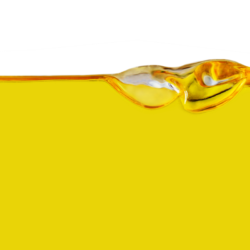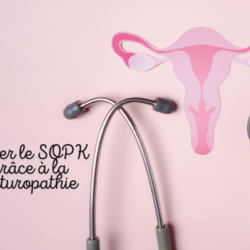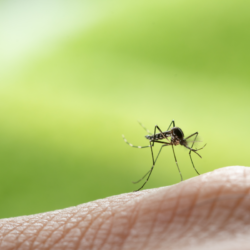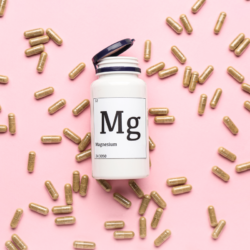Hormonal balance plays a crucial role in the harmonious functioning of our bodies. However, many factors can upset this delicate balance, leading to health problems such as hormonal imbalance. Hormonal imbalance can manifest itself in a number of ways, including menstrualirregularities, severepremenstrual symptoms, skinproblems and fertility disorders. Fortunately, certain naturalsolutions can help restore this delicate balance, and evening primrose oil is one of them.
How does the menstrual cycle work?
The menstrual cycle, a key biological process for women of childbearing age, involves a series of events regulated by sex hormones. On average, the cycle lasts 28 days, although this can vary between 21 and 35 days for different women.
1. Follicular phase
The follicular phase begins with the first day of menstruation and lasts around 14 days. During this phase, follicle-stimulating hormone (FSH), secreted by the pituitary gland, stimulates the growth of ovarian follicles. These follicles produce oestrogen, which is essential for preparing the endometrium (the lining of the uterus) for the possible implantation of an embryo.
2. Ovulation
The increase in oestrogen levels triggers the release of luteinising hormone (LH) by the pituitary gland. This LH peak triggers ovulation, i.e. the release of the mature oocyte from the ovary, usually around the 14th day of the cycle.
3. Luteal phase
After ovulation, the ruptured follicle transforms into a corpus luteum, which produces progesterone. Progesterone maintains the thickness of the endometrium with a view to pregnancy. If the oocyte is not fertilised, the corpus luteum degenerates, leading to a drop in progesterone levels.
4. Menstruation
The drop in progesterone levels causes the endometrium to shed and menstruation to begin, marking the start of a new cycle.
What is a hormonal imbalance?
Hormonal imbalance occurs when hormone levels in the body are disturbed, which can have a significant impact on a person’s health and well-being. This hormonal imbalance can be caused by a number of factors, including:
- Stress: Chronic stress can disrupt the normal functioning of the endocrine glands responsible for hormone production. When the body is under constant stress, it can lead to over- or under-production of hormones, creating an imbalance.
- Unbalanced diet: A diet lacking in essential nutrients can lead to nutritional deficiencies that affect the production and regulation of hormones. Inadequate intakes of vitamins, minerals and essential fatty acids can upset hormonal balance.
- Unhealthy lifestyle: Unhealthy lifestyle habits such as excessive alcohol consumption, smoking, lack of physical exercise and sleep deprivation can have a negative influence on hormone function. These factors can disrupt the production, regulation and elimination of hormones in the body.
- Menopause: The menopause is a period of natural hormonal transition for women, marked by a decrease in oestrogen and progesterone levels. This hormonal change can lead to a variety of symptoms and imbalances, such as hot flushes, mood swings and sleep disturbances.
- Medical conditions: Certain medical conditions such as polycystic ovary syndrome (PCOS), hypothyroidism or hyperthyroidism, as well as other endocrine disorders, can lead to hormonal imbalances. These conditions can affect the production, regulation or metabolism of hormones in the body.
Symptoms of hormonal imbalance can vary from person to person. However, some common symptoms may include:
- Irregular periods: Abnormal menstrual cycles, such as periods that are too frequent, too infrequent or absent.
- Mood swings: Frequent mood swings, irritability, anxiety or depression.
- Fatigue: A feeling of constant tiredness, lack of energy and motivation.
- Hot flushes: Episodes of intense heat and sudden sweating.
- Skin problems: Skin conditions such as acne, eczema or dry, sensitive skin.
Can my periods stop if I don’t eat enough?
Yes, periods can stop or become irregular if a person does not eat enough. This condition is known as functional hypothalamic amenorrhoea. It occurs when the body reacts to physical or psychological stress, such as severe calorie restriction or weight loss.
- Underlying mechanism: Insufficient nutrition reduces the production of the hormone gonadotropin-releasing hormone (GnRH) by the hypothalamus. This hormone is essential for stimulating the pituitary gland to produce follicle-stimulating hormone (FSH) and luteinising hormone (LH), which are crucial for the normal menstrual cycle. Consequently, a reduction in GnRH leads to reduced levels of FSH and LH, thus disrupting the menstrual cycle.
- Impact on ovarian function: Reduced FSH and LH levels affect follicular maturation and ovulation, which can lead to amenorrhoea. In addition, oestrogen levels may decrease, affecting bone health and other bodily functions.
- Reversibility and treatment: Functional hypothalamic amenorrhoea is generally reversible. Restoring adequate nutrition and a healthy body weight can help restore normal hormone levels and resume the menstrual cycle. It is advisable to consult a healthcare professional for a proper diagnosis and treatment advice.
Evening primrose oil: a natural solution
Evening primrose oil is extracted from the seeds of the Oenothera biennis plant, also known as ‘evening primrose’. This oil is rich in essential fatty acids, particularly gamma-linolenic acid (GLA), an omega-6 fatty acid. GLA is essential for hormone production and regulating inflammatory processes in the body.
The benefits of evening primrose oil for hormonal imbalance
- Regulation of oestrogen levels: Evening primrose oil contains gamma-linolenic acid (GLA), an essential fatty acid that plays a key role in regulating oestrogen levels in the body. Oestrogens are crucial hormones for balanced hormonal function. When there is an imbalance in oestrogen levels, this can lead to a variety of symptoms and health problems. Evening primrose oil can help to restore this balance by promoting adequate oestrogen production and helping to regulate its activity in the body. This helps to maintain a healthy hormonal balance and reduce the symptoms associated with hormonal imbalance.
- Alleviation of premenstrual syndrome (PMS) symptoms: Many women suffer from unpleasant premenstrual symptoms before their period, such as abdominal cramps, bloating, irritability and mood swings. Evening primrose oil can be beneficial in reducing the intensity of these symptoms and improving quality of life during the menstrual period. Evening primrose oil’s anti-inflammatory and hormone-regulating properties help to reduce the physical and emotional discomfort associated with PMS. By incorporating evening primrose oil into their routine, women can experience noticeable relief from premenstrual symptoms, promoting hormonal balance and overall well-being.
- Improved skin problems linked to hormonal imbalance: Hormonal imbalances can lead to skin problems such as acne, eczema and other skin conditions. Evening primrose oil has anti-inflammatory and moisturising properties that can help reduce skin inflammation, soothe irritation and promote healing. By applying it topically to the skin or consuming it as a dietary supplement, evening primrose oil helps to maintain skin health and reduce the appearance of skin problems linked to hormonal imbalance.
- Improved reproductive health: Evening primrose oil can play a positive role in women’s reproductive health. It promotes ovulation and helps regulate menstrual cycles. Regular ovulation is essential for fertility and overall reproductive health. In addition, for women with polycystic ovary syndrome (PCOS), which is characterised by hormonal imbalances, evening primrose oil can help regulate hormone levels, which can have a positive impact on fertility and the symptoms associated with PCOS.
How should evening primrose oil be used?
It is important to follow the dosage recommendations when using evening primrose oil. In general, it is recommended to take 1 to 3 grams of evening primrose oil a day, divided into several doses. Evening primrose oil can be taken in capsule form or added to foods such as salads. However, it is essential to consult a healthcare professional before starting any supplement, as there may be drug interactions and contraindications.
Other natural remedies for hormonal imbalance
As well as evening primrose oil, there are a number of other natural measures you can take to promote hormonal balance in your body. These holistic approaches can complement the use of evening primrose oil and help you maintain optimal hormonal balance. Here are a few additional tips for looking after your hormonal health:
Balanced diet:
A healthy, balanced diet plays an essential role in maintaining hormonal balance. Opt for foods rich in essential nutrients, such as fresh fruit and vegetables, lean proteins, whole grains and healthy sources of fat, such as avocados and nuts. Avoid processed foods high in added sugars and saturated fats, as these can upset hormonal balance.
Regular exercise:
Regular exercise is beneficial for overall health, including hormone balance. Physical activity helps reduce stress, improves blood circulation and contributes to maintaining a healthyweight. Choose an activity that you enjoy, whether it’s walking, swimming, yoga or dancing, and try to do it regularly.
Stress management :
Chronic stress can upset hormonal balance. Implementing stress management techniques can therefore be beneficial to your hormonal health. Try relaxation methods such as meditation, deep breathing, yoga or activities that help you relax and recharge.
Adequate sleep :
Getting enough quality sleep is essential for maintaining hormonal balance. Try to go to bed and wake up at regular times, create a sleep-friendly atmosphere in your bedroom, avoid screens before bed and practise relaxation rituals to promote restful sleep.
Medicinal plants :
Certain medicinal plants are renowned for their beneficial properties on hormonal balance. Sage is known for its hormone-regulating properties, particularly in cases of hormonal imbalance linked to the menopause. Chaste tree is also traditionally used to relieve the symptoms of premenstrual syndrome and regulate menstrual cycles.
FAQ
- What is evening primrose oil? Evening primrose oil is a vegetable oil extracted from the seeds of the Oenothera biennis plant, also known as evening primrose.
- How does evening primrose oil help to regulate hormones? Evening primrose oil contains gamma-linolenic acid (GLA), an essential fatty acid that promotes hormone production and regulates inflammatory processes.
- What are the potential side effects of evening primrose oil? Potential side effects of evening primrose oil may include headaches, gastrointestinal problems and drug interactions. It is important to consult a health professional before using it.
- What is the recommended dosage for evening primrose oil? The recommended dosage varies, but generally it is recommended to take 1 to 3 grams of evening primrose oil a day, divided into several doses.
- Is evening primrose oil safe during pregnancy? It is best to consult a health professional before taking evening primrose oil during pregnancy, as some supplements may not be recommended during this period.







